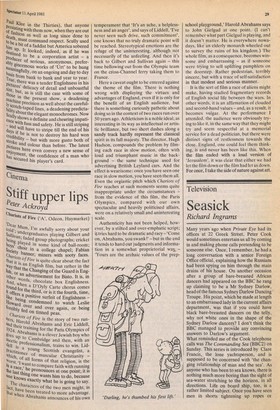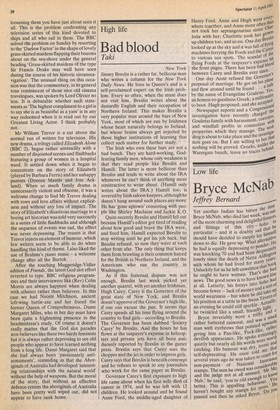Television
Seasick
Richard Ingrams
Many years ago when Private Eye had its offices at 22 Greek Street, Peter Cook would sometimes entertain us all by coming in and making phone calls pretending to be someone else. Once, I remember, he had a long conversation with a senior Foreign Office official, explaining how the Russians had been spying on him through the main drains of his house. On another occasion after a group of bare-breasted African dancers had appeared on the BBC he rang up claiming to be a Mr Sydney Darlow, head of the famous Sydney Darlow Dancing ' Troupe. His point, which he made at length to an embarrassed lady in the current affairs department, was that if you could have black bare-breasted dancers on the telly, why not white ones in the shape of the Sydney Darlow dancers? I don't think the BBC managed to provide any convincing answers to Darlow's argument.
What reminded me of the Cook telephone calls was The Commanding Sea (BBC2) on Sunday. This series is introduced by Clare Francis, the lone yachtsperson, and is supposed to be concerned with 'the changing relationship of man and the sea'. As anyone who has been to sea knows, there is nothing much more boring than the sight of sea-water stretching to the horizon, in all directions. Life on board ship, too, is a rather limited subject. Once you have seen men in shorts tightening up ropes or loosening them you have just about seen it all. This is the problem confronting any television series of this kind devoted to ships and all who sail in them. The BBC solved the problem on Sunday by resorting to the Darlow Factor' in the shape of lovely grass-skirted maidens flapping their bosoms about on the sea-shore under the general heading 'Grass-skirted maidens of the type Sir Francis Drake may well have seen during the course of his historic circumnavigation'. The unusual thing on this occasion was that the commentary, in its general tone reminiscent of those nice old cinema travelogues, was spoken by Lord Olivier no less. It is debatable whether such statements as The highest compliment to a girl is to say she is as beautiful as a yam' is in any way redeemed when it is read out by our Greatest Living Actor. I think probably not.
Mr William Trevor is a cut above the normal run of writers for television. His new drama, a trilogy called Elizabeth Alone (BBC 2), began rather unsteadily with a number of disjointed scenes and flashbacks featuring a group of women in a hospital ward. It settled down when it began to concentrate on the story of Elizabeth (played by Barbara Ferris) and her unhappy parents (Doreen Mantle and Joss Ackland). When so much family drama is unnecessarily violent and obscene, it was a welcome change to find Mr Trevor dealing with rows and love affairs without explicitness and without any loss of impact. The story of Elizabeth's disastrous marriage to a boring art historian was told very succinctly in a series of little flashbacks and although the sequence of events was sad, the effect was never depressing. The reason is that Trevor injects an element of humour, which few writers seem to be able to do when handling this kind of theme. I also liked the use of Brahms's piano music — a welcome change after all the Bartok.
After the touching Muggeridge-Vidler edition of Friends; the latest God slot effort reverted to type. BBC religious programmes and their interviewers li10 (Rev) Colin Morris are always happiest when dealing with atheists rather than believers. In this case we had Naomi Mitchison, ancient left-wing battle-axe and her friend the former Queen of Comprehensives, Dame Margaret Miles, who in her day must have been quite a frightening presence in the headmistress's study. Of course it doesn't really matter that the God slot parades non-believers like these two hardy feminists but it is always rather depressing to see old people who appear to have learned nothing from a long life. Dame Margaret said that she had always been 'passionately antiarmaments', reminding us that the Aboriginals of Australia had developed 'interesting relationships with the natural world' without the help of weapons. But the moral of the story, that without an effective defence system the aboriginals of Australia have been pretty well wiped out, did not appear to have sunk home.











































 Previous page
Previous page